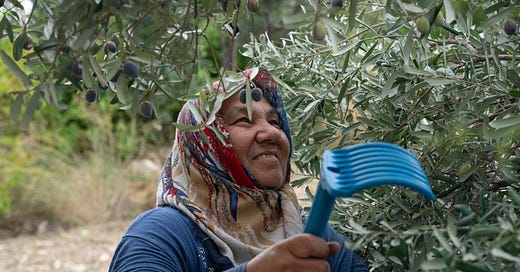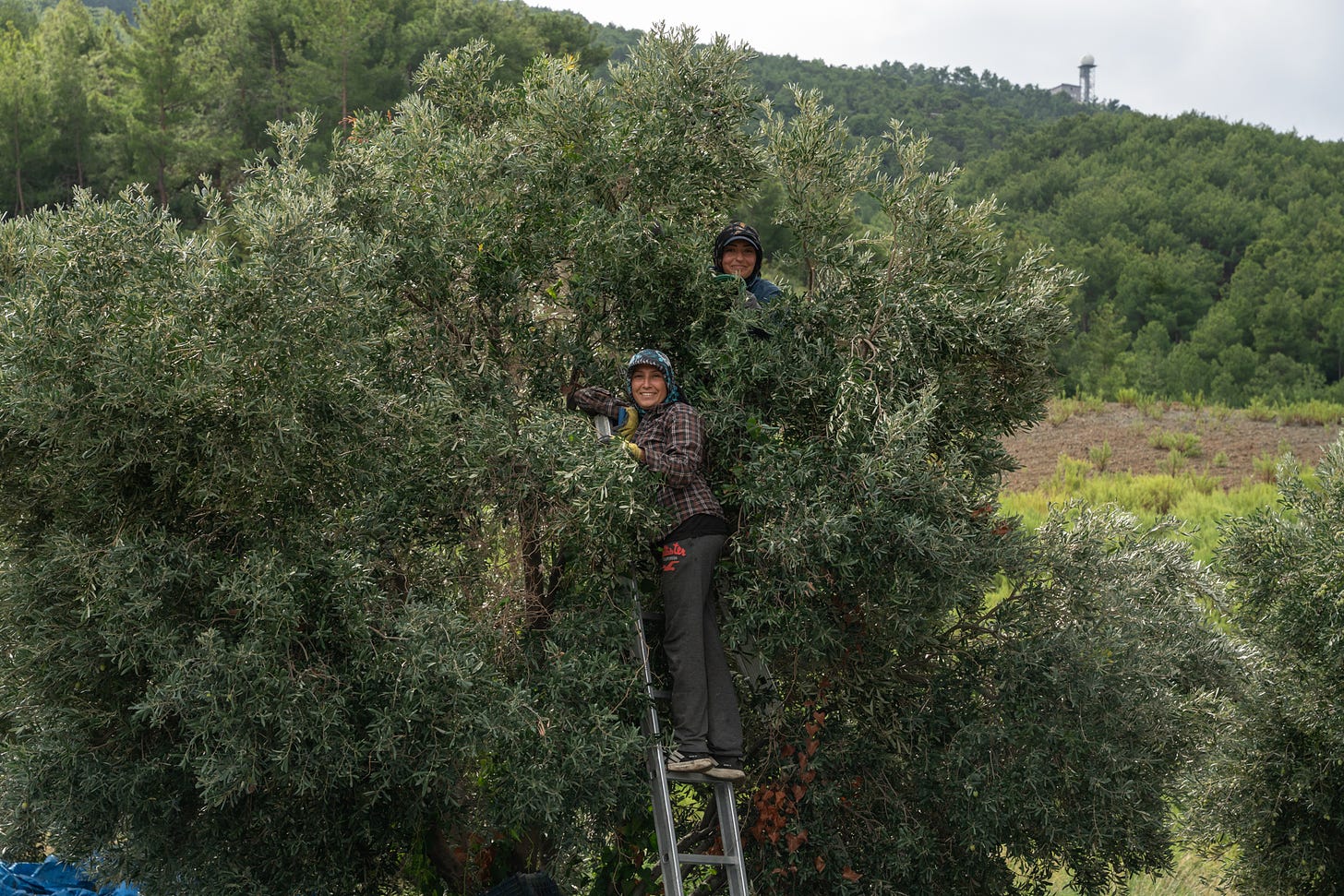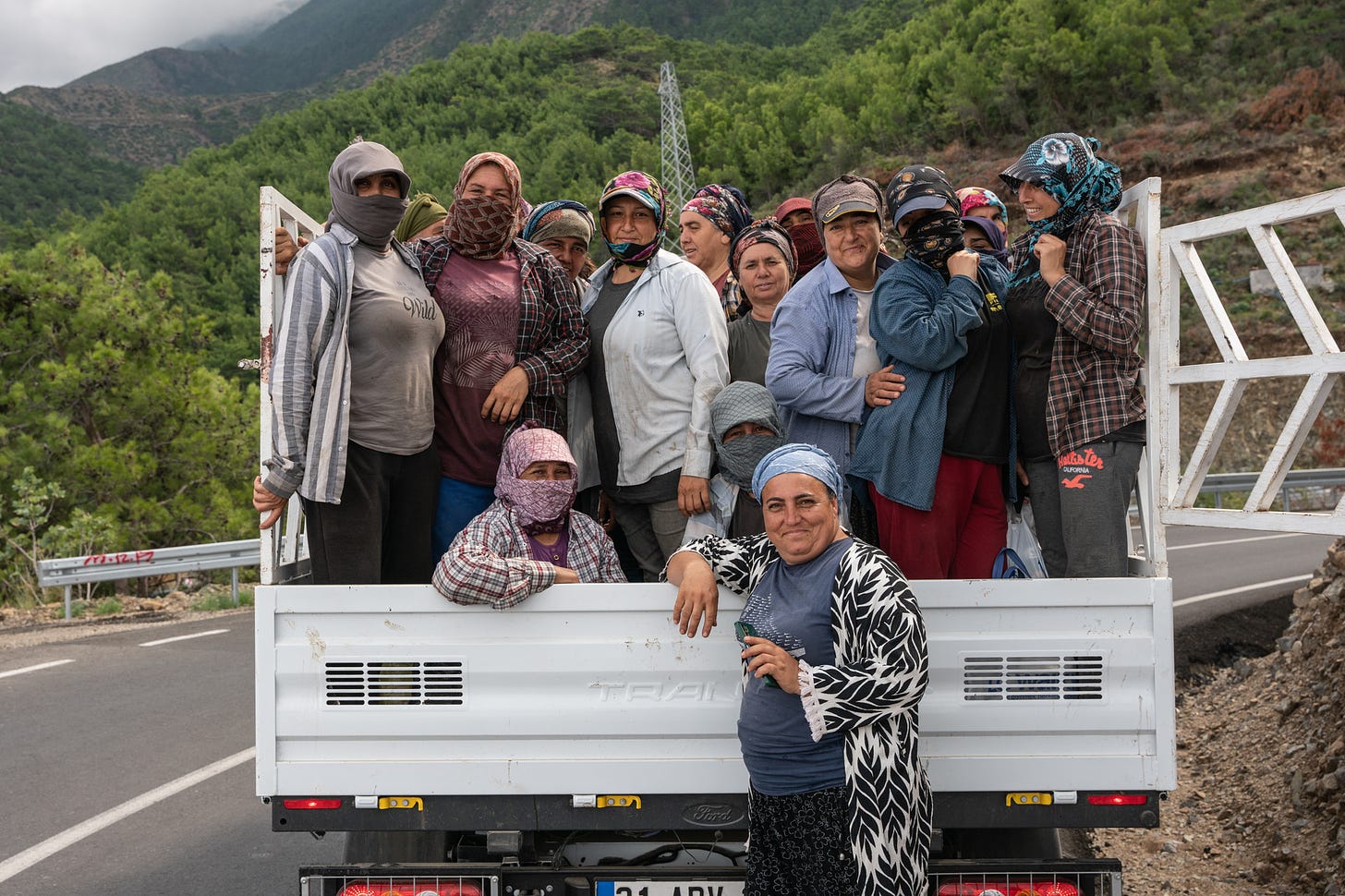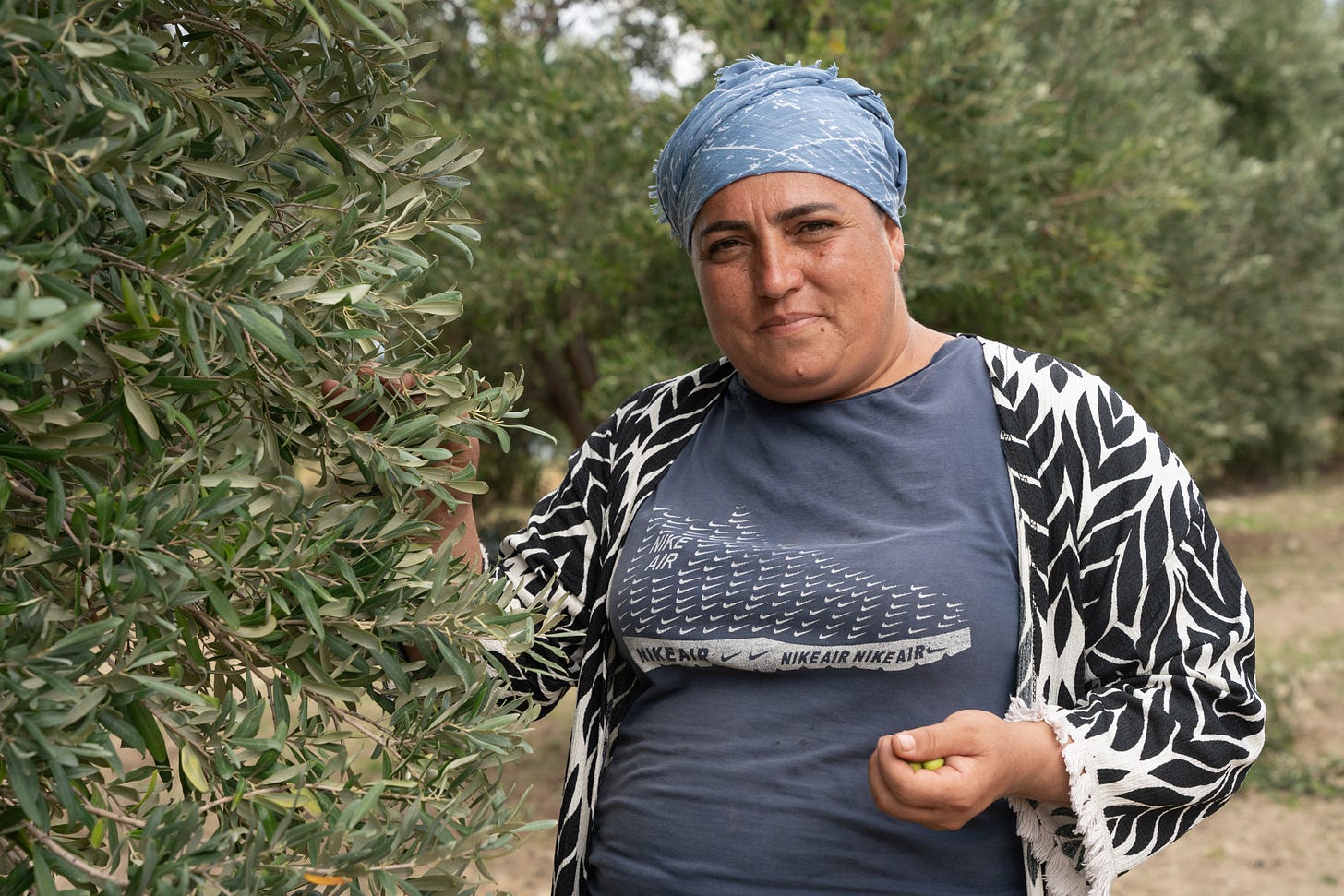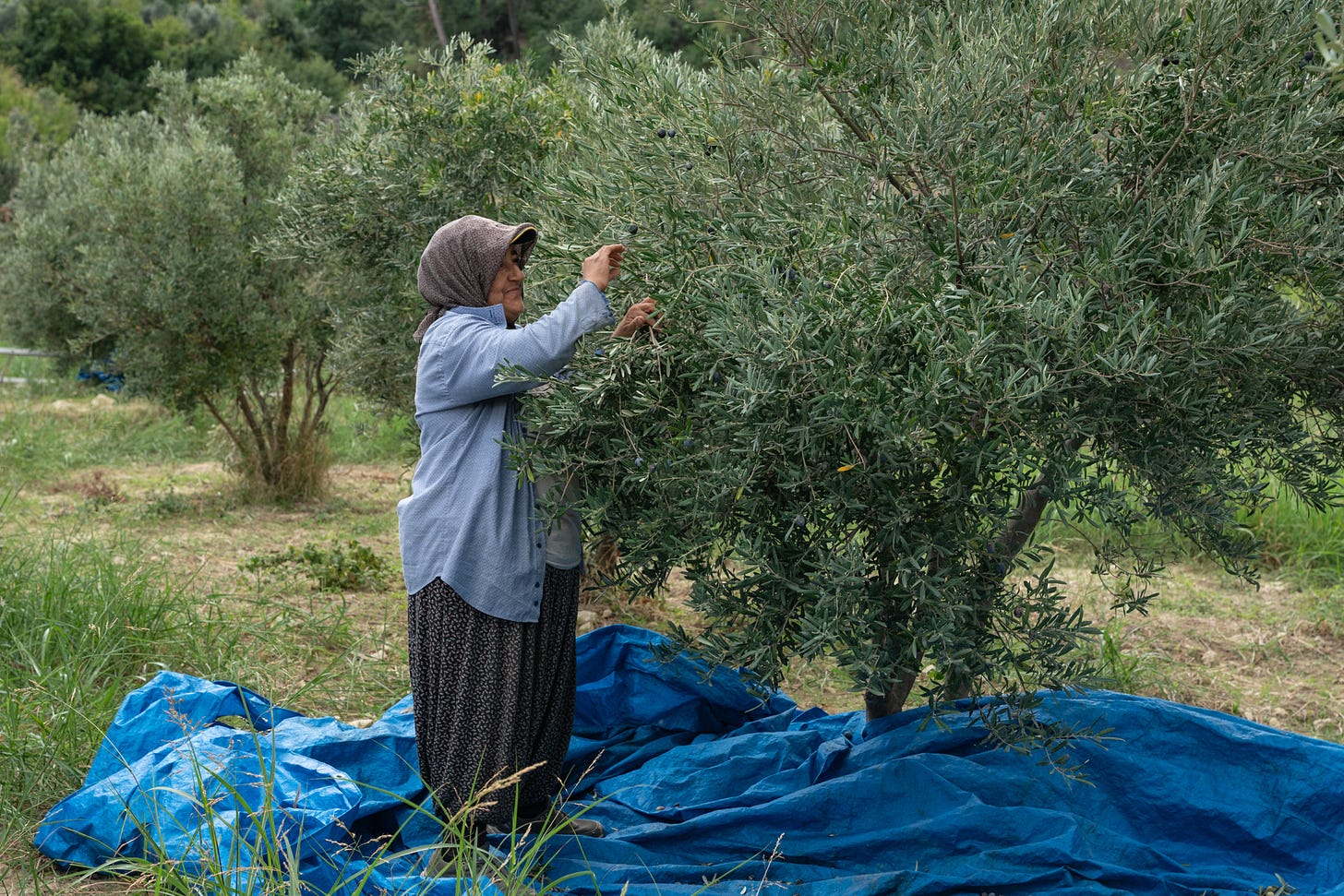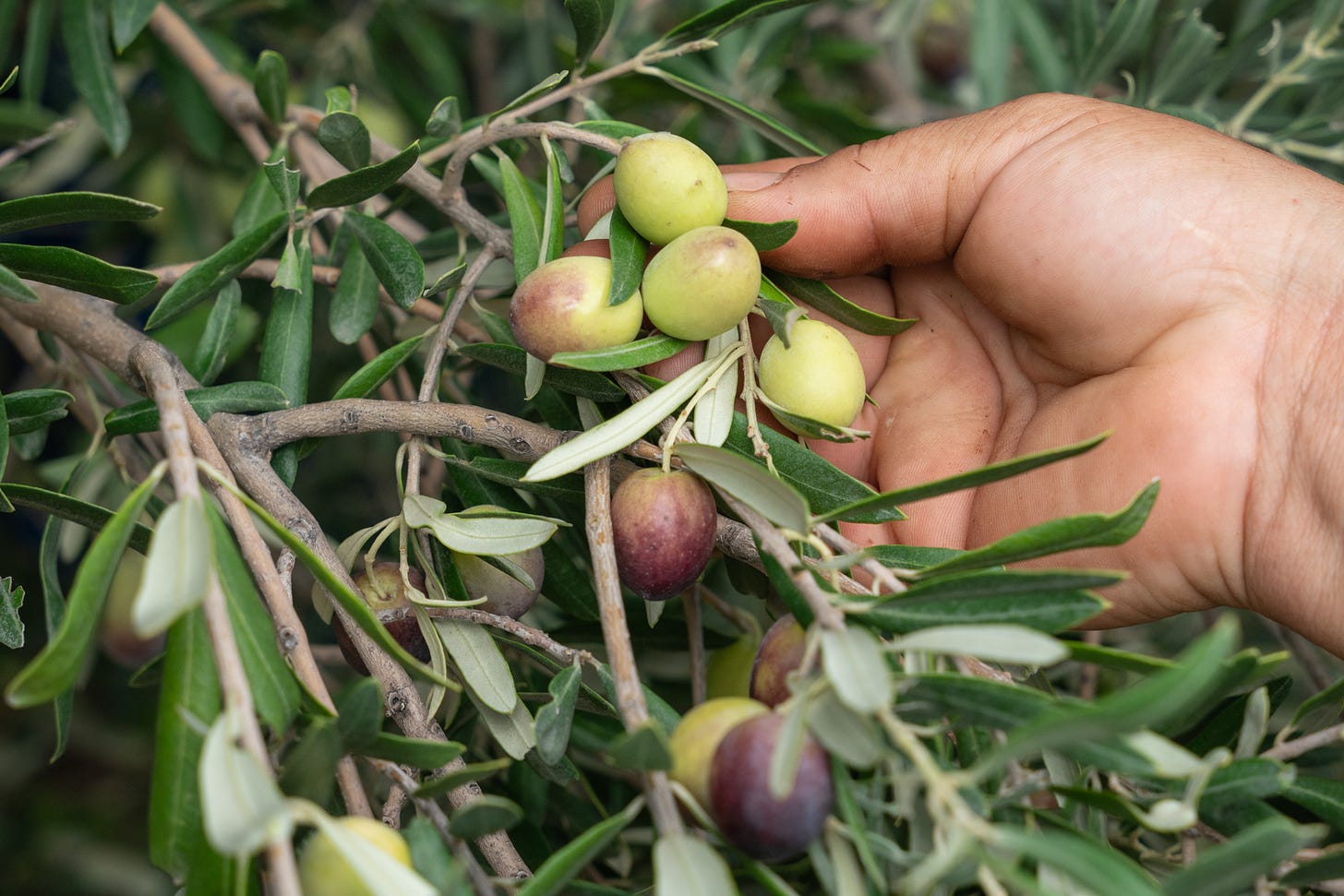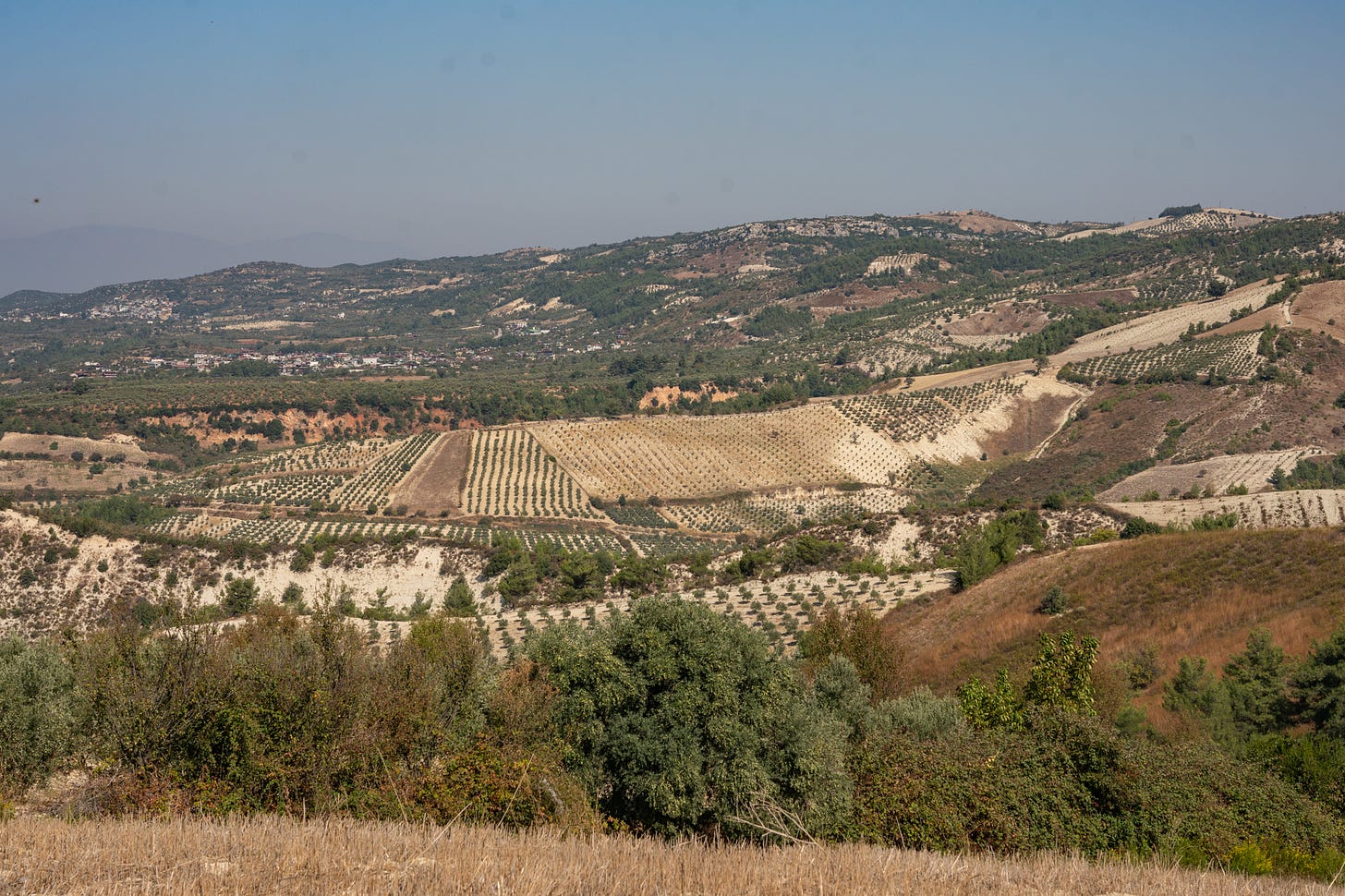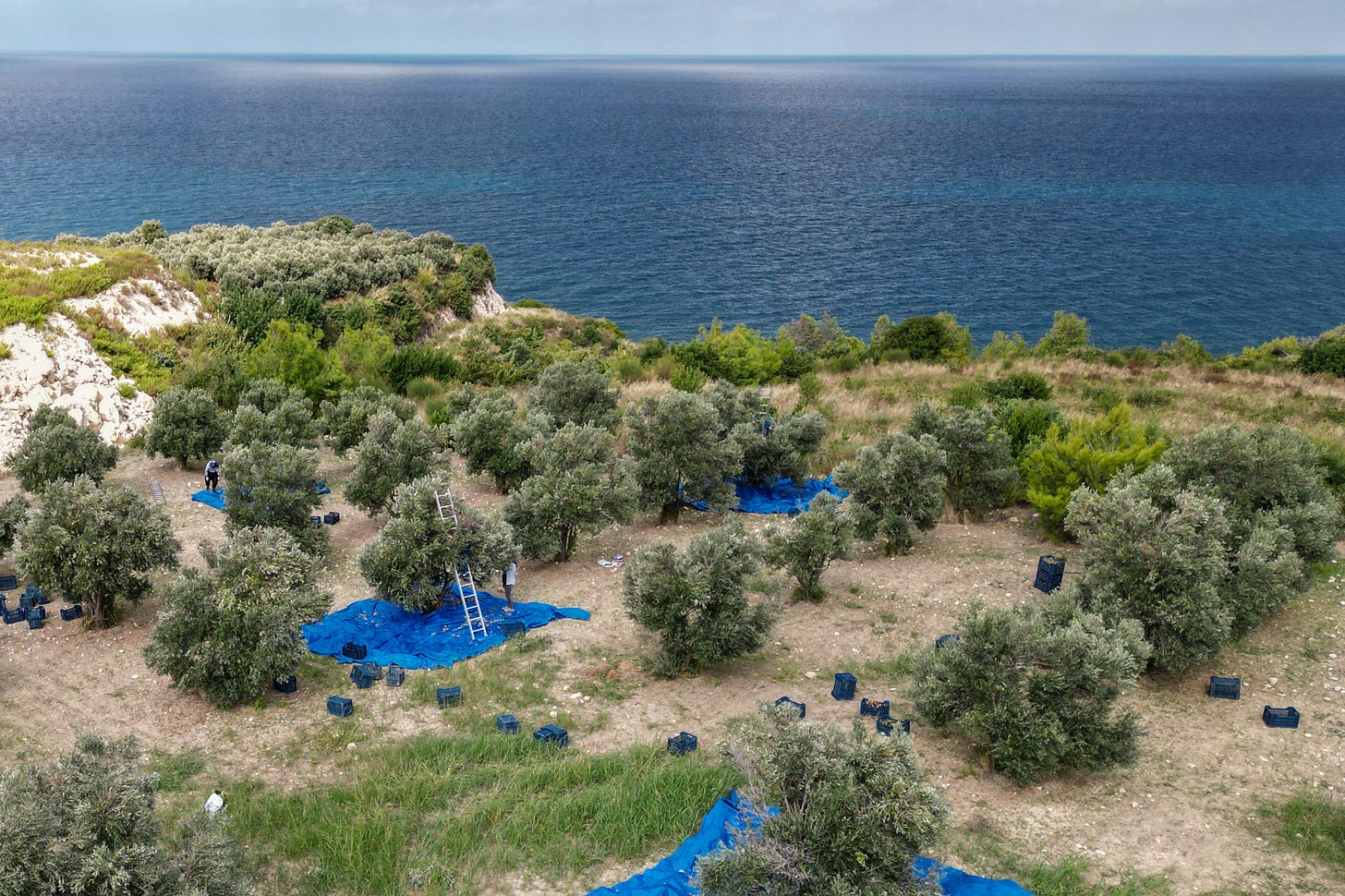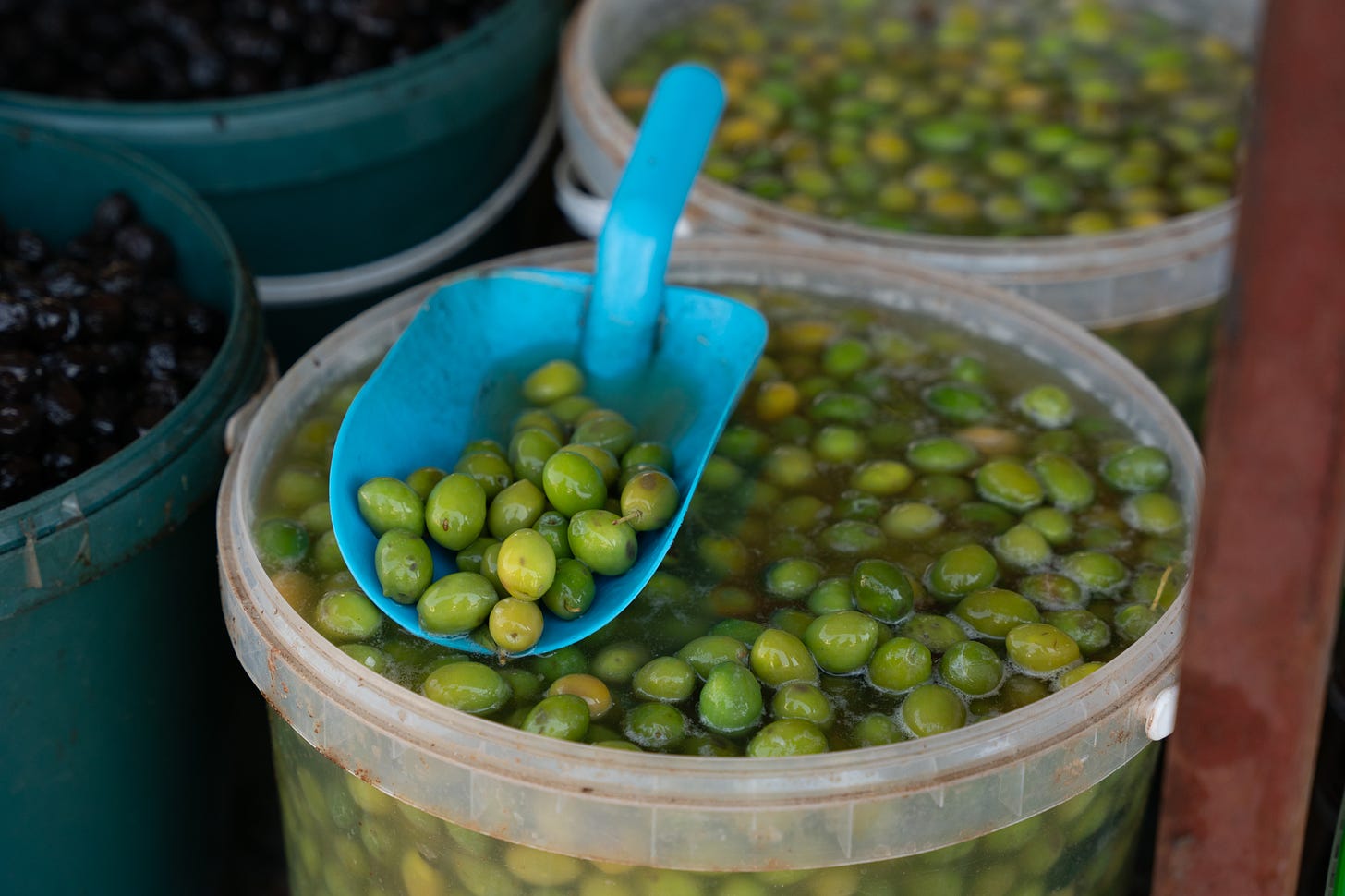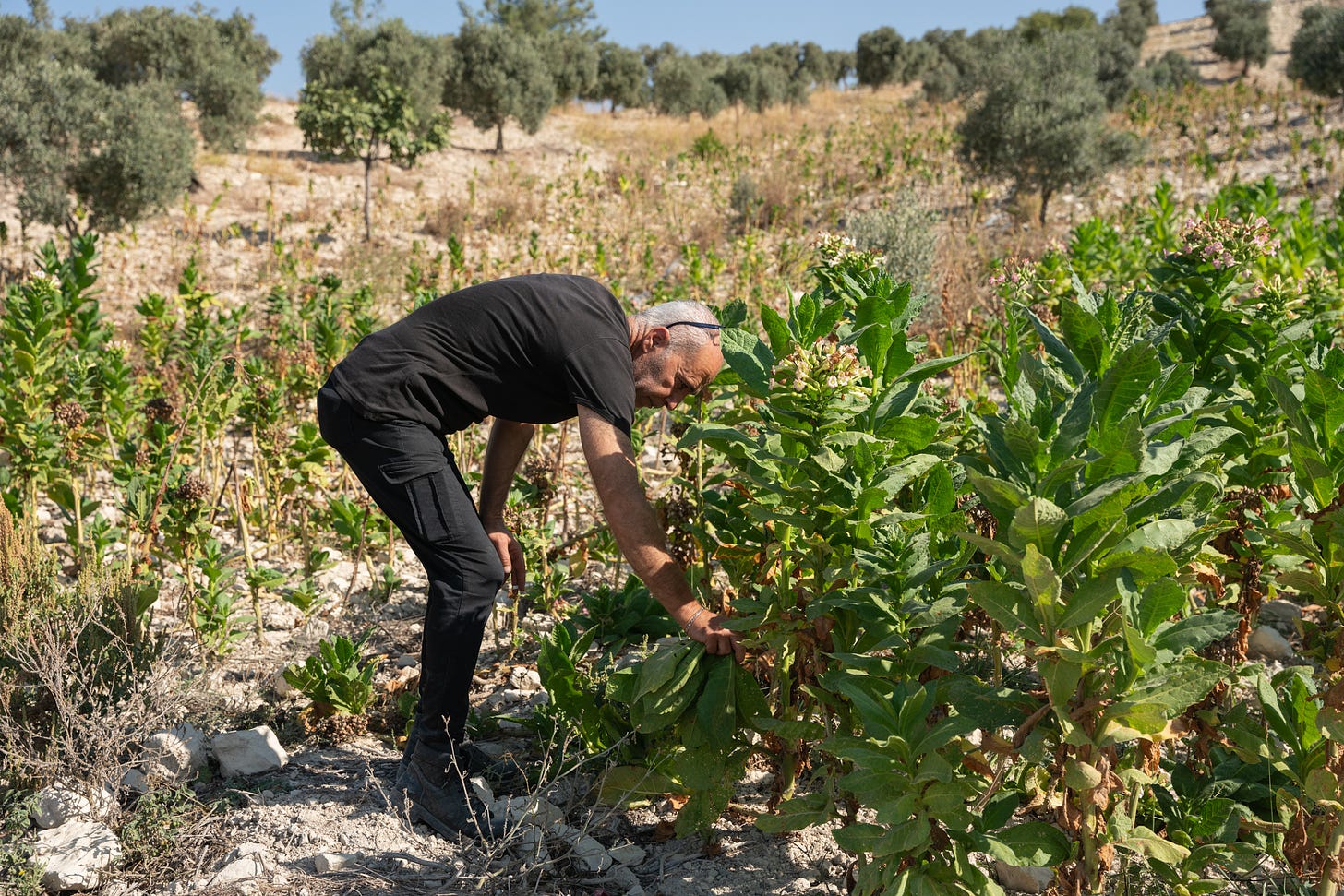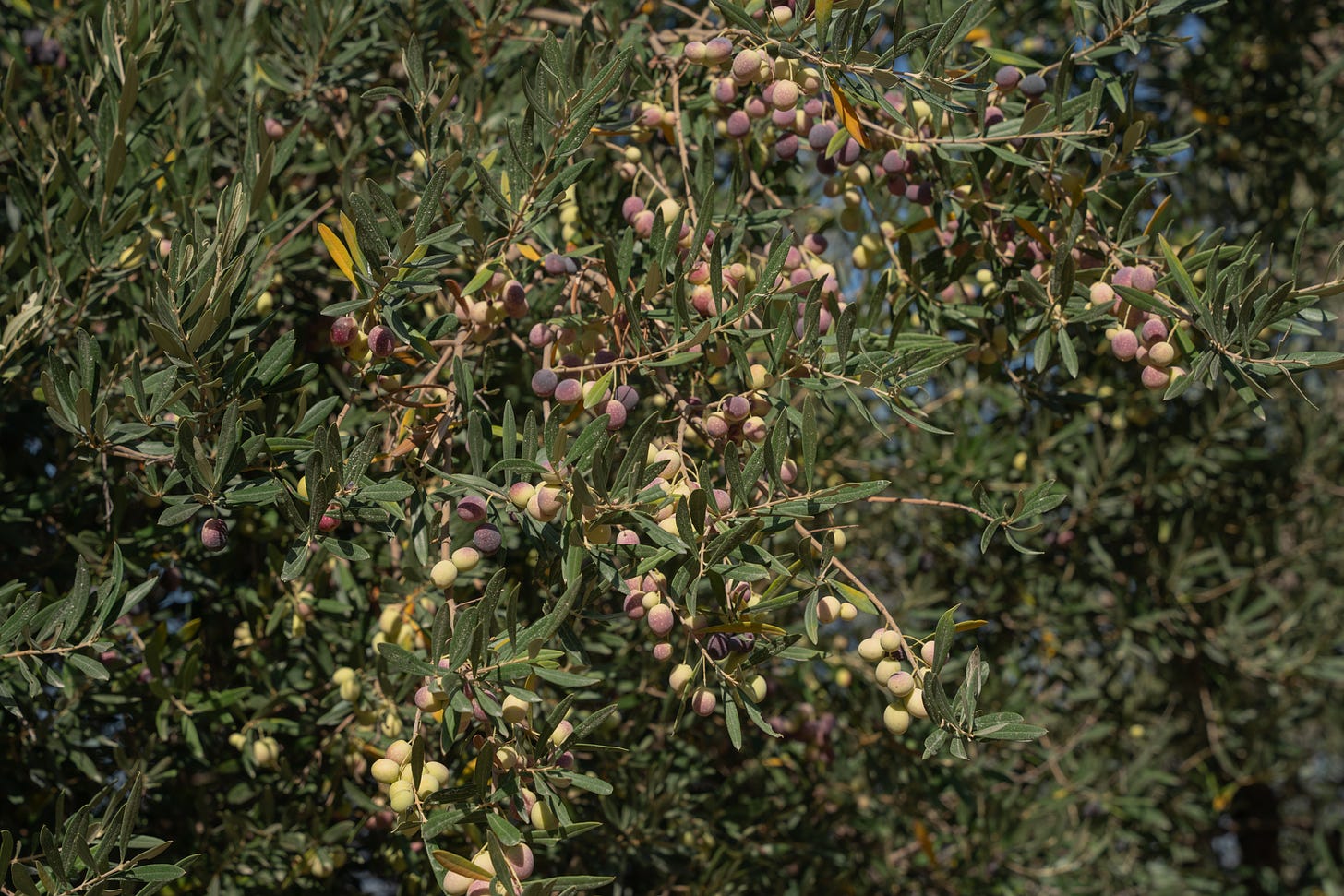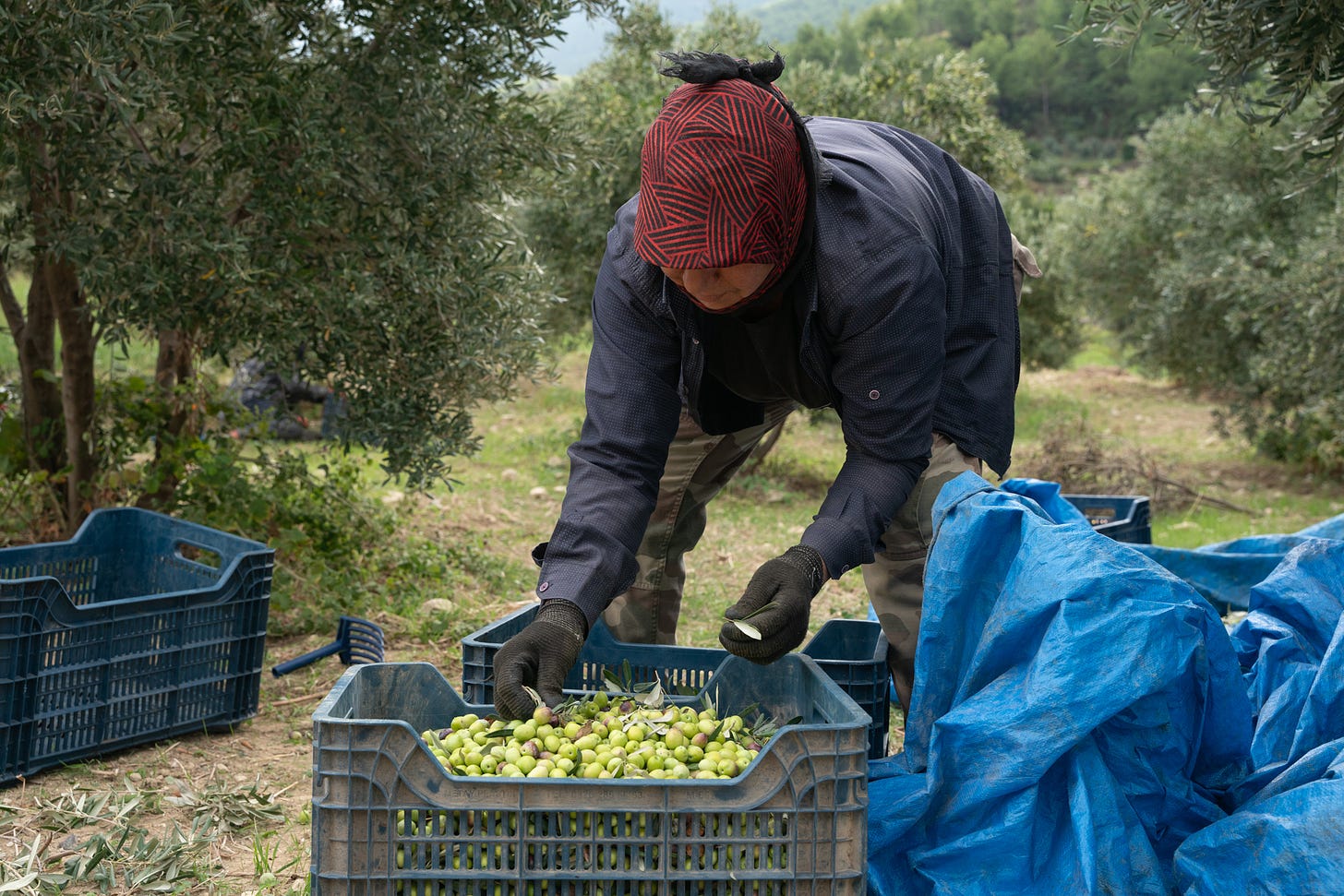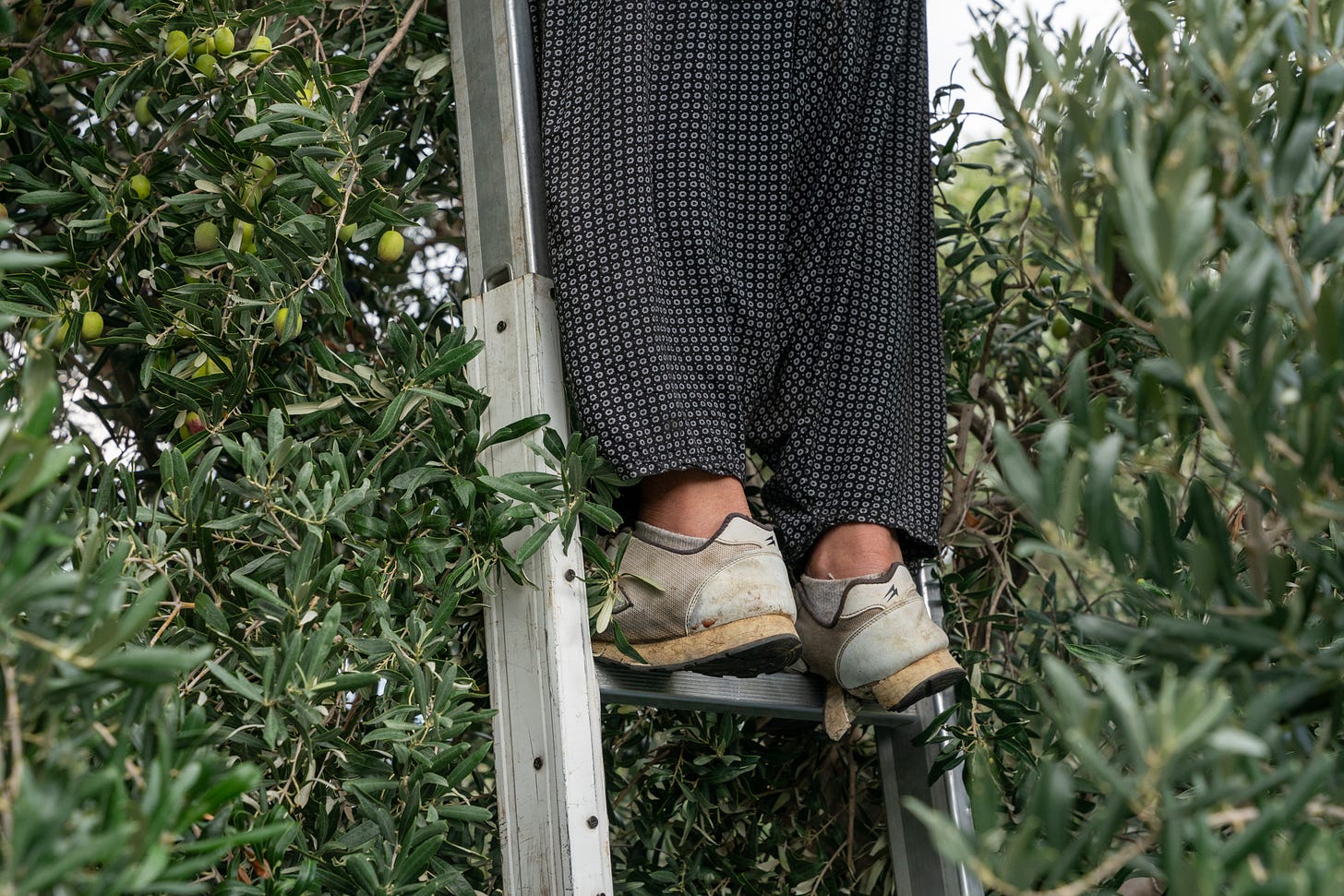HATAY — Jokes and laughter can be heard from among the olive trees in a field on the coast of Arsuz, a village in the southern Turkish province of Hatay. Here, two dozen women are hard at work on the hilly land, with a view of the Mediterranean Sea on one side and the Amanos Mountains on the other.
Seven days a week, from early morning to midday, the workers comb through the trees one by one, gathering the olives and depositing them on plastic tarps spread on the ground.
Between 30 and 50 years old, the women have fun together and are ready to pose for pictures even after a tiring workday. “We became one family; we do our job with joy,” Ayşe Yalın said.
Behind the smiles are sweat and sore bodies. In late autumn, the temperature still reaches 30 degrees Celsius (over 80 degrees Fahrenheit). The women earn 800 Turkish liras per day (about US $23) for the tiring work. Some women need the money to make ends meet, and others use it to pay for their children’s education.
“[Olives] provide us with bread,” says Yalın, the 38-year-old çavuş of the group. Literally, çavuş means “Sergeant,” but the term also refers to the captain of a group of agricultural workers. “Normally, men would do this, but I’m the only woman çavuş in the area,” she says with pride.
Originally from a village close to the orchard, Yalın has been working in fields for as long as she can remember, and agriculture is the main source of income for her and for many other workers in Hatay. From October until the end of December, they work in olive orchards, and when there are no olives left to pick, they continue with mandarins, parsley, or whatever produce is in season.
The olive harvest in Hatay is more than just a seasonal tradition – it's a crucial part of the region’s economy and cultural identity. With some 13 million olive trees in the province, for many, it represents not only their livelihood but also the resilience of a community that was devastated by the earthquakes on February 6, 2023 – a community that is now finding strength in the land that has sustained them for generations.
Many of the local olive orchards are far enough from fault lines, so the majority of trees survived. Though most olive businesses are still reeling from the physical, psychological or financial damages of the quakes, the harvest provides work opportunities for many, and the production of fresh olive oil is crucial for the regional culinary culture.
While Yalın and her colleagues continue working in orchards, preparations for the harvest also continue in the city. Serra and Işıl Nalçabasmaz, sisters who run Meriç Çiftliği, one of the province’s well-known olive oil businesses, are getting ready for a new harvest season at a temporary office next to their depot on the outskirts of Antakya.
The Nalçabasmaz Family has been in the olive business for five generations, and the sisters, working together with their father and uncle, developed a new brand years ago specializing in quality olive products. In addition to olive oil, they produce tomato spreads, jams, and soaps, but their main focus is on the region’s olives, which they believe have not received the recognition and attention they deserve. For years, the oil produced from Hatay’s olives was mainly used to make soap, due to a lack of infrastructure for producing high-quality olive oil. The Nalçabasmaz sisters wanted to prove that olive from Hatay is not only suitable for soap but also for making delicious oil for consumption.
When they told others about their ambitions for Hatay olives, people were surprised. “‘Are there olives in Hatay?’ people asked me,” Serra, who is also a food engineer, said. “This place is known historically as the homeland from which olives spread to the world. It is sad that for a long time, they only used to produce soap,” she added.
In Turkey, the Aegean region is more well-known for its olives and olive oil. When asked how the olives in Hatay differ from their Western peers, Serra explained, “I can’t say the olives here are like this, and in the Aegean they are like that, because every olive has its own unique aroma profile. Even if it is of the same variety, the aroma profile is affected by the region where it is grown.”
One noticeable difference is that olives of the Hatay region have Arabic names, like Halhalı (the most common), Halebi, or Karamani. To promote these local varieties, Meriç Çiftliği focuses on a single olive oil blend, for which they have won various awards.
As the harvest starts, the company is still dealing with the aftermath of the earthquake. It hit at the end of the harvest season, when Meriç Çiftliği was running at full capacity. Even a basic cleanup took weeks because the area had no running water for a long time.
Işıl recalls the first time she entered their depot on the outskirts of Antakya, on the third day after the earthquake. “It was an olive oil pool – there was olive oil flowing from everywhere. There were ten-ton tanks inside, and they all fell over,” she said.
Just a month and a half later, the team managed to send out their first post-earthquake order. “After that, we slowly started to get things in place here, but of course, it's still not fully back on track,” Işıl said, adding that many employees left the city after the earthquake. Meriç Çiftliği is still not putting products in glass jars on shelves, fearing another earthquake might destroy their stock once again.
Işıl is the marketeer of the two, and while recounting the dark days after the disaster, she serves us a stack of zeytinli ekmek, which literally means “bread with olives.” This Antakya specialty, traditionally baked during the olive harvest season, is soft and delicious, the slightly spicy olives balanced out with the fresh lavaş bread.
When we finished the bread, we made the 50-minute drive from the office to the Meriç Çiftliği olive orchard. On the way to the farm, the hills were dotted with olive trees. Next to one orchard, a camp appeared, consisting of shipping containers turned into emergency housing following the earthquakes. It is a somber reminder that thousands all over the affected region still live in temporary shelters.
Meriç Çiftliği, a 150-year-old farm, was not affected by the earthquake and became an emergency shelter for a lot of workers after the disaster. It is situated in Altınözü, one of the province’s districts neighboring Syria. As we arrived, we could see that its 100,000 olive trees, scattered over an area of more than 2,000 acres, are all still intact. “Most of those trees are more than one hundred years old,” Ayhan Korkmaz, who has been serving as the farm’s caretaker and the chief mechanic for years, told us. While we took a walk around the farm, he showed us olive trees of different ages, and other products like tobacco, wild fruits, and vegetables.
According to Korkmaz, due to insufficient pressing (degreasing) technology and low efficiency, the number of olive growers in the region was very limited a few decades ago. However, while the former main product of the region, tobacco, lost its profitability in recent decades, olive oil has been on the rise in terms of price. For him, it also changed people’s eating habits.
“In the old days, there weren’t this many oil factories in the region,” he explained. “The producers needed to wait for their turn, and some olives rotted during that time. Where can you use that oil? Only for soap.”
But now, with the new machines and factories, yield and production has increased. “We didn’t eat this much olive oil before,” Korkmaz said. “Now, almost ninety-nine percent of our dishes are made with olive oil, and it has become the jewel on the crown.”
This place also holds a special place in the heart of chef and writer Özlem Warren, who shot the photos for her cookbook Sebze at the Meriç Çiftliği farm in Altınözü. Her family roots in Antakya go back five generations. Warren’s grandfather, Suphi Dede, was a food merchant who traded within Hatay province but also in Aleppo before the Syrian civil war. Her paternal grandfather, Ali, was a soapmaker. “They produced olive oil soap, which we religiously used,” Warren remembers. “They were so passionate about it – you wouldn’t be clean enough if you didn’t go to the hammam and wash yourself with olive oil soap.”
Olive oil was also a constant on her family’s table.
“Food culture was a massive part of our lives, abundance, and hospitality,” Warren points out, a characteristic mentioned by many other Antakyalı as well. “[And olive oil] is being used not only in cooking … it’s life, really. Olive oil is used every day for breakfast, lunch, cooking and zeytinyağlı. [It’s] a massive part of the cuisine.”
Meaning “with olive oil” in Turkish, zeytinyağlı are vegetables cooked in olive oil. “Gently poached, slow cooked in a little bit of water and generous olive oil,” Warren explains. “[The dish can] be vegetarian, and we tend to eat it at room temperature or cold. It could be vegetables incorporating grains, like merçimek mualla, which is an Antakya dish with green lentils and aubergines cooked in olive oil with dried mint and peppers.”
While Antakya is famous for its kebabs, Warren is passionate about showing how Antakya cuisine and Turkish food in general can also be very suitable for vegetarians. “Gosh, we have so many regional varieties, so many ways to enjoy vegetables,” she said. “I want to open [readers’] eyes to that tradition and the richness of availability of Turkish vegetarian food.”
To produce these vegetables, agricultural workers like Ayşe Yalın and her colleagues are crucial. Yet Yalın hopes her daughter will have better employment opportunities. The reason she works in the field is so her daughter can go to university, an opportunity Yalın never had. “She wants to be an aerospace engineer,” Yalın said proudly.
The olives are not only Yalın’s bread, they are also the metaphorical butter. “It is our source of income, but also our culture. We eat olive oil with everything – no sunflower oil for us,” Yalın said.
This newsletter is supported by readers via Substack and Patreon. Paid subscribers get full access to our recaps, reports, members-only chat and news tracking tools. All proceeds go towards sustaining our journalism.
Turkey recap is produced by the Kolektif Medya Derneği (KMD), an İstanbul-based non-profit association founded by our editorial team to support and elevate news media and journalists in Turkey. Contact us: info@turkeyrecap.com
Diego Cupolo, Editor-in-chief @diegocupolo
Gonca Tokyol, Editor-at-large @goncatokyol
Ingrid Woudwijk, KMD president @deingrid
Emily Johnson, Deputy editor @emilyjohnson
Damla Uğantaş, Tr Türkçe editor @damlaugantas
Azra Ceylan, Economy reporter @azraceylani
Dénes Jäger, Editorial intern @denesjager

